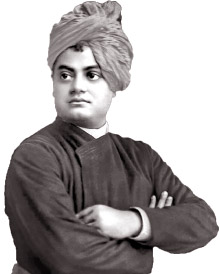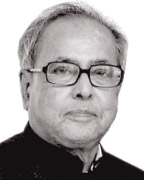The extraordinary insights of Swami Vivekananda
150th birth anniversary:
Lakshman , I. Keerthisinghe , LLB, LLM. MPhil,
Attorney-at-Law
 Take up one idea. Make that one idea your life
– think of it, dream of it, live on that idea. Let the brain, muscles,
nerves, every part of your body, be full of that idea, and just leave
every other idea alone. This is the way to success and that is the way
great spiritual giants are produced.” Take up one idea. Make that one idea your life
– think of it, dream of it, live on that idea. Let the brain, muscles,
nerves, every part of your body, be full of that idea, and just leave
every other idea alone. This is the way to success and that is the way
great spiritual giants are produced.”
-- Swami Vivekananda
On January 12, 2013 the President of India Pranab Mukherjee
inaugurated the 150th Birth anniversary celebrations of Swami
Vivekananda at Rashtrapati Bhawan in New Delhi in the presence of
Congress President Sonia Gandhi and several Union Ministers. A set of
commemorative coins and commemorative stamps on Swami Vivekananda were
released on the occasion.
Anniversary celebrations
|

Swami Vivekananda
|
The Indian High Commissioner in Sri Lanka Ashok K Kantha said that
Swami Vivekananda was one of the great makers of modern India, a great
teacher and spiritual leader who left a deep impact both within India
and outside. He was one of India’s earliest cultural ambassadors who was
able to propagate Indian philosophy, thought and culture to the outside
world.
He was speaking at a ceremony organized by the All Ceylon Hindu
Congress to mark the 150th birth anniversary celebrations of Swami
Vivekananda at Vivekananda Hall, Colombo. Kantha thanked the All Ceylon
Hindu Congress, Vivekananda Society of Colombo and Ramakrishna Mission
for taking the lead in celebrating the 150th birth anniversary of Swami
Vivekananda in Sri Lanka. Kantha highlighted special links of Swami
Vivekananda with Sri Lanka, which he visited thrice. The High
Commissioner underlined that Swami Vivekananda’s message was universal
and was based on rationality and righteousness.
Swami Vivekananda known in his pre-monastic life as Narendra Nath
Datta was born to an affluent family in Kolkata, India on January
12,1863. His father Vishwanath Datta was a successful attorney with
interests in a wide range of subjects and his mother Bhuvaneshwari Devi
was a lady with strong character and deeply devoted to religion.
At school Narendra excelled in music, gymnastics and studies. He
graduated from the University of Calcutta having read Western Philosophy
and History. In 1881, Narendra met Sri Ramakrishna, who was staying at
the Kali temple in Dakshineshwar. Narendra’s first question was whether
Sri Ramakrishna had seen God.
Words of wisdom
Without a moment’s hesitation, Sri Ramakrishna said.’ Yes I have. I
see Him as clearly as I see you, only in a much intense sense.’ Thus
began a guru-disciple relationship and the beginning of the monastic
life of Swami Vivekananda. Due to Swamiji’s in depth knowledge of
Western Philosophy he was able to build a bridge of understanding
between Indian and Western cultures.

Sonia Gandhi |

Pranab Mukherjee |
Netaji Subash Chandrabosh wrote: “Swamiji harmonised the East and the
West, religion and science, self reliance and self assertion from his
teachings”. Swamiji opened the minds of the Indians to their duty of
caring for the downtrodden masses. Swamiji said “They alone live who
live for others, the rest are more dead than alive. This is the gist of
all worship –to be pure and to do good to others. Religion is the
manifestation of the Divinity already in man.”
Speaking of Character, Swamiji said: “Neither money pays, nor name,
nor fame. It is Character that can cleave through formidable walls.” He
further advised: “Get up and put your shoulders to the wheel-how long is
this life for? As you have come to this world, leave some mark behind.
Otherwise what is the difference between you and the tree and stones?
They too come into existence, decay and die.” He said: “A few
wholehearted, sincere, energetic men and women can do more in a year
than a mob in a century.”
Swamiji’s words of wisdom are very valuable for the people of the
world to lead a good life. Speaking of Action, he said: “We are
responsible for what we are and whatever we wish to be. We have the
power to make ourselves. If what we are now has been the result of our
past actions, it certainly follows whatever we wish to be in future can
be produced by our present actions.”
Western follower
So we have to know how to act. This saying is the same as that which
is preached in Buddhism of the effect of Karmic force. As The Buddha
said: “Effects of Sins follow the perpetrator as the cart wheel follows
the bull tied to the cart and meritorious acts follow the doer as his
shadow, which never leaves him.”
We have witnessed this happen in the past and know that those who
commit sins, however powerful they are today would eventually have to
account for such sins. Philosophy of Swamiji is almost the same as
Buddhist Philosophy.
Speaking of Commitment, Swamiji said; “Even a fool can accomplish a
task, if it were after his or her heart.
But the intelligent ones are those who can convert every work into
one that suits their heart.” He further stated: “Every duty is holy and
devotion to duty is the highest form of worship of God. When you are
doing any work, do not think of anything beyond. Do it as worship, as
highest worship and devote your whole life to it for the time being.”
Swamiji spoke of Fear and Fearlessness thus: “Be not afraid of
anything. You will do marvelous work. The moment you fear you are
nobody. It is fear that is the great.”
“They alone live who live for others, the rest are more dead than
alive.” It is fear that is the greatest of all superstitions. It is fear
that is the cause of our woes and it is fearlessness that brings heaven
even in a moment. Therefore “Awake, arise and stop not till the goal is
reached. The earth is enjoyed by ‘Heroes’. This is the unfailing truth.
Be a Hero always. Say “I have no fear”. Swamiji also stated: “Society
does not go down because of the activities of criminals; but because of
the inactivity of the good people.”
Swamiji speaking of thoughts made this profound statement: “We are
what our thoughts have made us, so take care about what you think.
Words are secondary. Thoughts live; they travel far.” Swamiji passed
away on July 4, 1902 at the early age of 39 years.
They say that the good die young. Swamiji travelled all over the
world and spoke at the University of Harvard, London, New York, Los
Angeles, San Francisco, Canada, Naples and other European countries.
Before his death, Swamiji wrote to a Western follower thus: “It may
be that I shall find it good to get outside my body, to cast it off like
a worn out garment.
But I shall not cease to work. I shall inspire men everywhere until
the whole world shall know that it is one with God.”
There are a magnitude of lessons that we can learn from this great
sage’s life and words of wisdom, which are very useful for the proper
conduct of our daily lives.
We daily read about conflicts, wars, torture, senseless massacres,
that are occurring all over the world.
Let me conclude with Swamiji’s words: “Education is the manifestation
of perfection already in man”.
|





